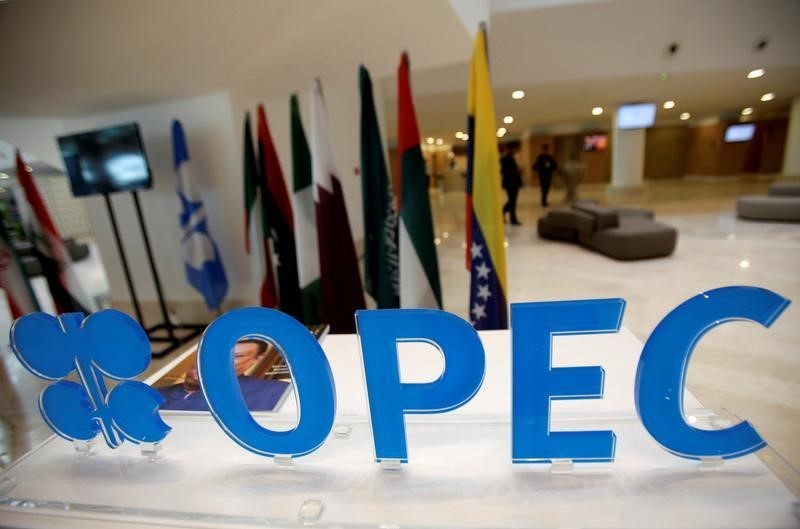* Saudis want stable oil price ahead of Aramco listing
* Deeper cuts unlikely, but better compliance to be stressed
* Rising U.S. output may pressure oil prices
By Rania El Gamal and Olesya Astakhova
DUBAI/MOSCOW, Nov 21 (Reuters) - OPEC and its allies are
likely to extend existing oil output cuts when they meet next
month until mid-2020, with non-OPEC oil producer Russia
supporting Saudi Arabia's push for stable oil prices amid the
listing of state oil giant Saudi Aramco.
The Organization of the Petroleum Exporting Countries meets
on Dec. 5 at its headquarters in Vienna, followed by talks with
a group of other oil producers, lead by Russia, known as OPEC+.
The current oil supply cuts run through to March 2020.
On Dec. 5, Saudi Arabia is set to announce the final pricing
of the initial public offering of Aramco, in what it hopes will
be the world's largest IPO. The oil price at the time is likely
to be key to Aramco's listing, expected around mid-December.
"So far we have two main scenarios: either meet in December
and extend the current cuts until June; or defer the decision
until early next year, meet before March to see how the market
looks and extend the cuts until the middle of the year," said an
OPEC source.
"It is more likely that we will extend the agreement in
December to send a positive message to the market. The Saudis
don't want oil prices to fall, they want to put a floor under
the prices because of the (Aramco) IPO."
OPEC sources said market conditions in the first quarter of
2020 remain unclear amid concerns of a slowdown in oil demand
and weak output compliance by some producers such as Iraq and
Nigeria, which is complicating the outlook.
An OPEC delegate said: "My feeling is that (an extension) to
end-June to avoid meeting again early March, with the
possibility of calling for an (earlier) meeting should market
conditions require it ... is the likely scenario as of today."
The two sources said formally announcing deeper cuts looked
unlikely for now although a message about better compliance with
existing cuts could be sent to the market.
Saudi Arabia, OPEC's de facto leader, wants to focus first
on boosting adherence to the group's production-reduction pact
before committing to any more cuts, they said. "The Saudis want to see how the rest of those who are not
complying (with the cuts) do first. There are no numbers being
circulated so far for deeper cuts or changing output quotas,"
said the first OPEC source.
Amrita Sen, co-founder of Energy Aspects think-tank, which
closely watches OPEC and Saudi oil policies, said a mere
extension by OPEC+ of the existing output cuts until June might
not be enough to support oil prices.
"The market expects a further cut and an extension until the
end of 2020. In any other scenario, the market will sell," she
said.
Russian President Vladimir Putin set the tone for the
December meeting last week, calling Saudi Arabia's position
ahead of the talks "tough". Moscow argues that it will find it hard to cut oil
production voluntarily during the cold winter months, especially
in western Siberia, where Russia produces two-thirds of its oil
and where most of its well rigs are located.
Freezing temperatures make it difficult for Russia to shut
in and restart wells in winter months.
"There is no doubt that Russia won't let the Saudis down in
case of a price collapse, given the upcoming IPO," said one
source familiar with Russian thinking.
He added that Putin had developed close ties with Saudi
Crown Prince Mohammed bin Salman and the Russian government was
aware that the three-year-old partnership could fall apart if
Russia did not support Riyadh.
The OPEC+ alliance has since January implemented a deal to
cut output by 1.2 million barrels per day, to help boost oil
prices trading now at $62 a barrel.
"This is not only about supporting Saudi Arabia. The deal,
without a doubt, is beneficial for Russia. The Russian budget
has received more than $100 billion from the deal. And the deal
has stabilized the Russian economy," Kirill Dmitriev, the head
of Russia's Direct Investment Fund, told Reuters.
Dmitriev and Energy Minister Alexander Novak were the key
architects of a deal with Saudi Arabia, which began in 2017.
Saudi Arabia and other Gulf producers in OPEC have been
delivering more than their share of promised cuts to stabilise
the market and prevent prices from falling.
In October, the kingdom raised its oil output to its OPEC
target, pumping 10.3 million bpd to replenish its inventories
after attacks on its facilities last month, but kept the volumes
of crude supplied to the market at 9.9 million bpd. Last week, OPEC Secretary-General Mohammad Barkindo said
U.S. shale oil supply growth could slow next year while demand
may have upside potential, appearing to downplay any need to cut
output more deeply.
